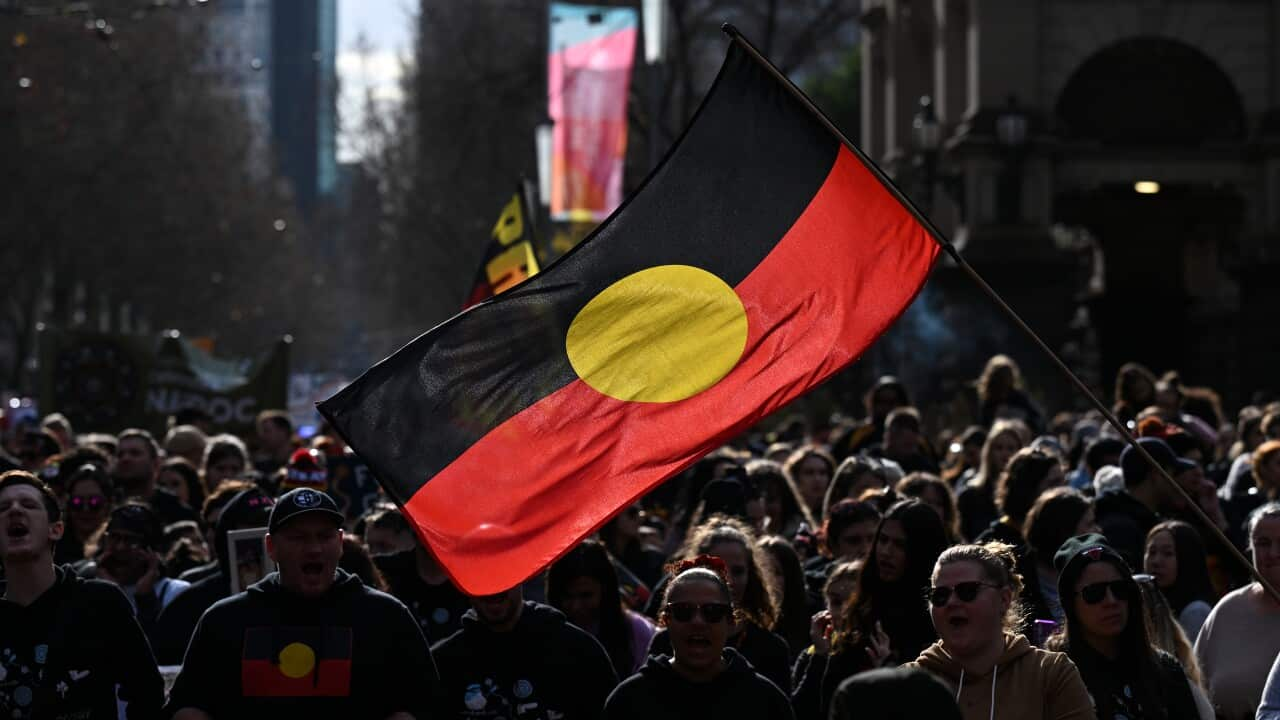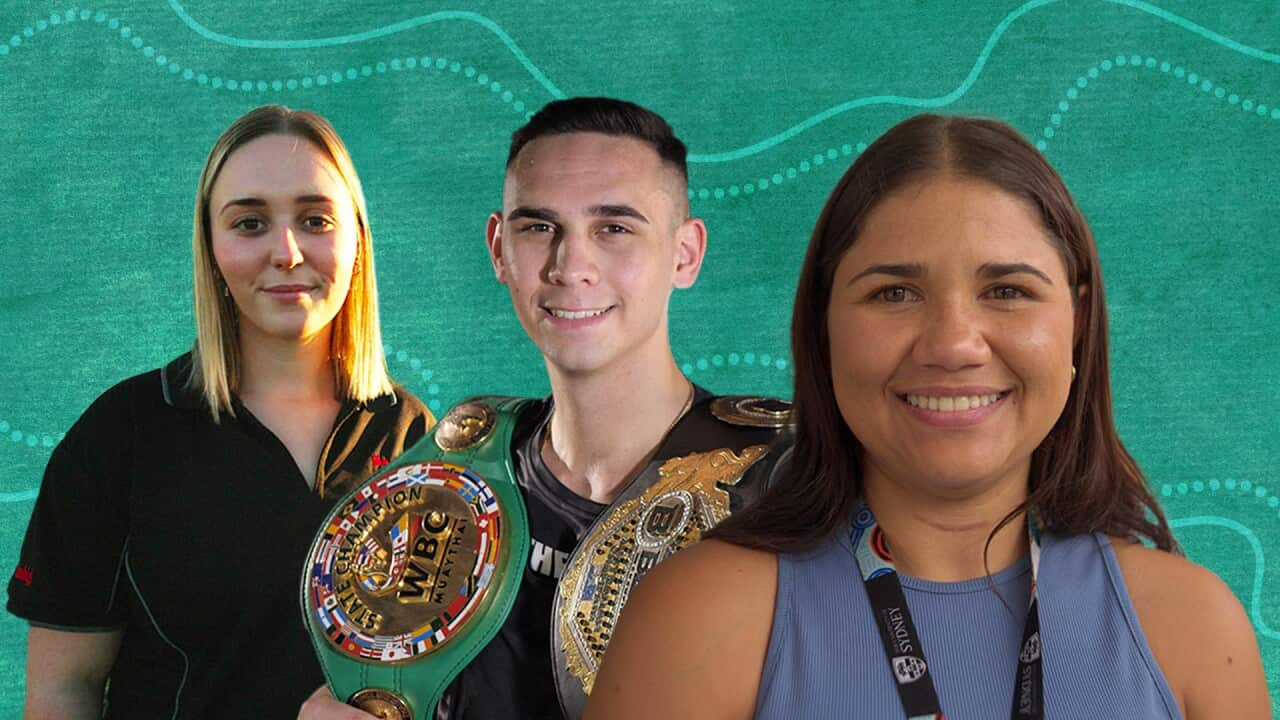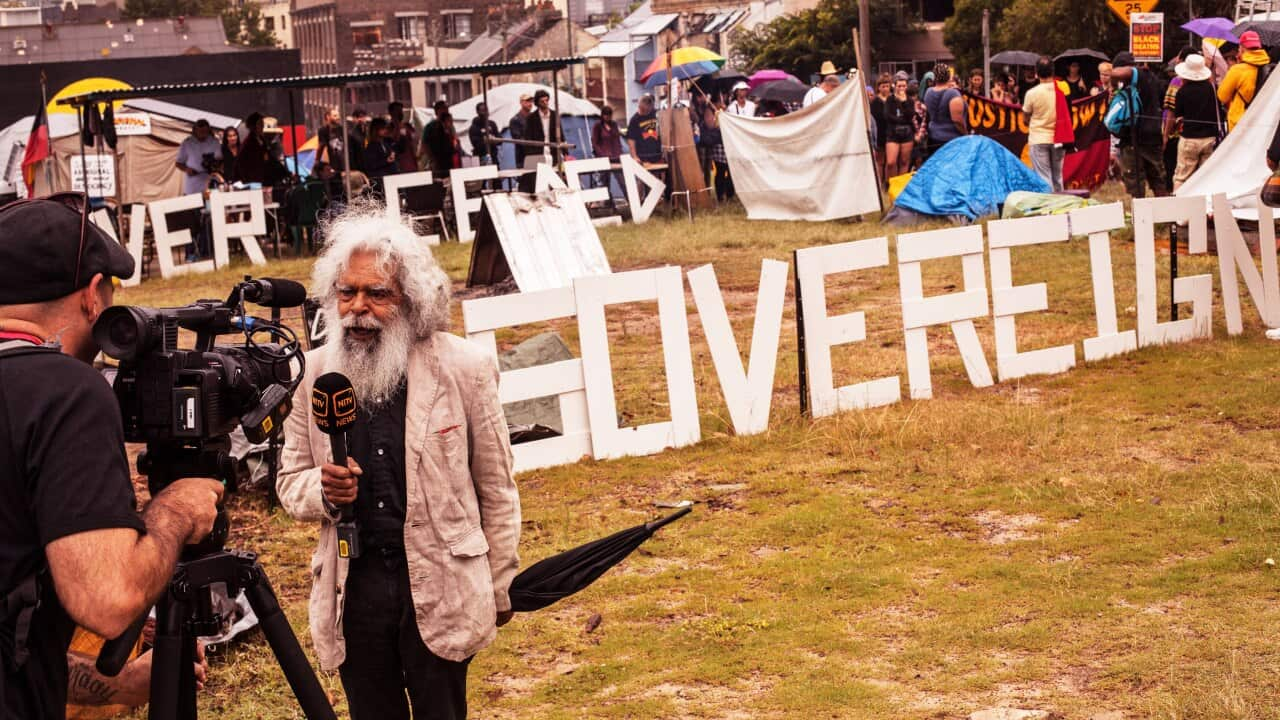NAIDOC week will be held across the country from 7-14 July this year, celebrating and recognising the history, culture and achievements of Aboriginal and Torres Strait Islander peoples.
NAIDOC Week's history stretches back to 1920. Initially a day of protest, it has evolved into a week-long celebration of Aboriginal and Torres Strait Islander peoples, culture and history.
The term NAIDOC stands for National Aborigines and Islanders Day Observance Committee.
What is NAIDOC Week?
NAIDOC Week celebrates Indigenous culture and excellence each year in the first week of July, including through the annual National NAIDOC Week Awards Ceremony.
NAIDOC committee member Kenny Bedford is a Traditional Owner from the Meuram Clan of Erub in the Torres Strait Islands.
He said the week is about coming together and celebrating 65,000 years of continuous culture.
"It [NAIDOC Week] is probably the most important in our calendar for Indigenous peoples," he said.
"It is the time when we can focus together around a theme to showcase those issues that are important to us. But especially for us to come together — and celebrate the fact that we are still here after all of these thousands of years, strong in our way and our culture. And very much a part of this Australian community."
What is the history of NAIDOC Week?
The event evolved from the 1920s protest movement calling for improved community understanding of the status and treatment of Aboriginal and Torres Strait Islanders.
Initially marked as a Day of Mourning, it was a boycott of Australia's national day. Observed annually on 26 January, Australia Day marks the day in 1788 when British explorers planted their flag at Sydney Cove, declaring the land theirs.
Over the years, the event shifted to become one of celebrating First Nations people, culture, and history.
The year 1955 marked a turning point in seeing the day event become a week-long celebration. A decision was made to hold the event annually in July.
In 1956, the federal government, working with Aboriginal and non-Aboriginal groups, established the National Aborigines Day Observance Committee. In the early 1990s, the committee's name was changed to include Torres Strait Islanders.

NAIDOC posters for the years 2016 until 2023. Each year, a poster is designed to convey the annual theme. Source: Supplied by Danyal Syed / NAIDOC Committee
Government policies between 1910 and 1970 meant that as many as one in three Indigenous children were forcibly taken from their families, according to the .
The loss of language has been another impact of colonisation. Before British colonisation, over 250 languages and 800 dialects were spoken in Australia.
Census data shows that now, there are 123 Aboriginal and Torres Strait Islander languages being spoken, based on national data from 2018-19.
Of that number, 20 had more than 1,000 speakers. But for almost half of the languages, there are fewer than 51 speakers.
What is the theme for 2024 NAIDOC Week?
The theme for this year, chosen by the National NAIDOC committee, is Keep the Fire Burning! Blak, Loud and Proud.
The organisers say the theme is designed to honour the "enduring strength and vitality of First Nations culture — with fire a symbol of connection to Country, to each other, and to the rich tapestry of traditions that define Aboriginal and Torres Strait Islander peoples".
Co-chair of the National NAIDOC Committee, Aunty Dr Lynette Riley, said this year's theme "is a clarion call to continued unity and solidarity for all Australians to come together and celebrate".
How is NAIDOC Week celebrated?
Across the country, local councils, community groups and sporting clubs hold NAIDOC Week events. The theme is also embodied by Indigenous Australians in their advocacy throughout the year.
The week also celebrates Indigenous excellence through the National NAIDOC Week Awards Ceremony, which was broadcast on NITV and ABC on 6 July, hosted by Narelda Jacobs, Rob Collins and Steph Tisdell.
Aunty Dulcie Flower received the Lifetime Achievement Award for her dedication to activism, advocacy and community development. Aunty Dulcie was born in Cairns in 1938, and her mother was of the Meriam People of Torres Strait.
Yorta Yorta, Dja Dja Wurrung, Taungurung, Boon Wurrung Elder Aunty Muriel Bamblett won the Person of the Year award.
Wiradjuri Elder Aunty Millie Ingram received Female Elder of the Year Award, while Kim Collard, a Balladong/Wadjuk elder of the Noongar nation won the Male Elder of the Year award.
Winners from 2023 include Aunty Dr Matilda House-Williams for Female Elder of the Year, Rachel Perkins for the Creative Talent Award and Professor Kelvin Kong for Person of the Year.
The late Rosalie Kunoth-Monks was named Person of the Year in 2015. The first ever Indigenous Australian female lead actor in the 1955 film Jedda, she then turned to social work and political activism.
The , a member of the Stolen Generations, was named the 2022 Male Elder of the Year.
In accepting the award, he said he was a survivor who had always been frank.
"I feel what I have done in the past and what I'm still doing, treading the boards, fronting the camera, and waggling the finger and stamping the foot and pointing the bone at irresponsible behaviour. It's a role of an Elder in my unique position," he said.
Bangarra’s former artistic director for 32 years, Stephen Page, won the 2016 Lifetime Achievement Award.
Athletes recognised over the years include NBA champion and four-time Olympian Patrick "Patty" Mills, retired NRL player Jonathan Thurston and two-time A-League championship winner and Olympian Jade North.
Retired tennis champion Ashleigh Barty was named 2022 Person of the Year.
Is there a public holiday during NAIDOC Week?
Over the years there have been calls for a public holiday during NAIDOC Week, but so far they have been unsuccessful.
The First Peoples’ Assembly of Victoria launched a petition in 2022, arguing a "NAIDOC Day public holiday would be inclusive, educate the wider community about our culture and celebrate our many successes".
The assembly is the independent and democratically-elected body representing Traditional Owners in Treaty negotiations in Victoria.
It said the origins of NAIDOC Week as a protest movement must not be forgotten.
"At the First Peoples' Assembly of Victoria, our work on Treaty builds upon the efforts of our predecessors, such as the activism of those who fought for the establishment of NAIDOC," the assembly said.
"...NAIDOC Week is an annual occasion of remembrance and resistance that has evolved into a national celebration of community, cultures and Country."





